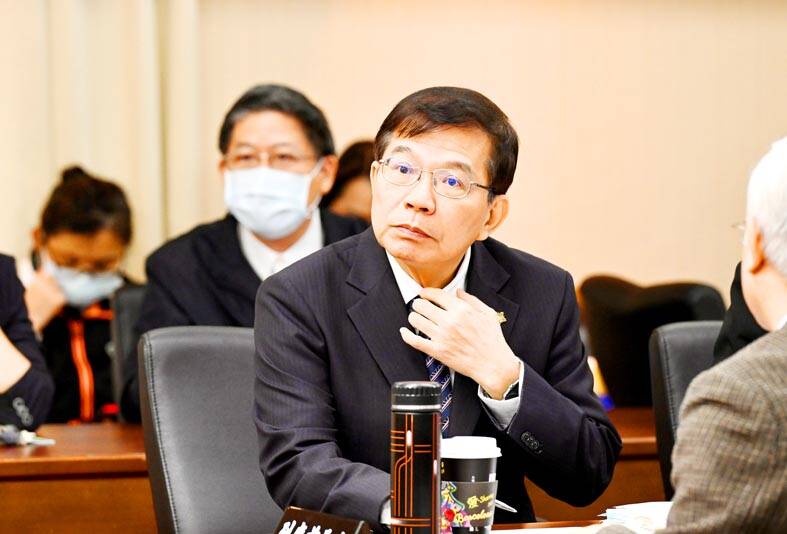Minister of Transportation and Communications Wang Kwo-tsai (王國材) yesterday assured lawmakers that there would not be any consumer disputes resulting from tour cancelations when the ban on group travel to China is lifted in March next year.
Wang made the remarks at the legislature’s Transportation Committee, which was scheduled to review the budget plans of the agencies under the Ministry of Transportation and Communications (MOTC).
However, lawmakers expressed concern over conflicting statements about the policy from the MOTC and Mainland Affairs Council (MAC).

Photo: Lo Pei-de, Taipei Times
MOTC officials said two-way group travel across the Taiwan Strait would return to normal in March and travel agencies could begin organizing tours, while MAC officials reiterated the number of Taiwanese group travelers allowed to visit China would still be capped at 2,000 per day, with the same cap applying to Chinese tourists to Taiwan.
Chinese Nationalist Party (KMT) Legislator Hung Meng-kai (洪孟楷) asked Wang exactly how many Taiwanese group travelers would be allowed to visit China per day when the ban is lifted in March, and whether travel agencies would be asked to cancel tours if the number of Taiwanese tourists exceeds the daily cap set by government.
Hung also pressed Wang for the adjustments on the cap that the ministry would make when more than 2,000 group travelers are to visit China per day.
“We had estimated that there would not be too many travelers at the beginning. The cap is adjustable, and I would not let disputes resulting from tour cancellations happen,” Wang said.
“I do not care what the MAC would say. The conclusion from cross-departmental meetings for now is that all group tours to China would be allowed in March so long as travel agencies have enough tourists to form tour groups,” Wang said.
Hung also suggested that a minister without portfolio be assigned to coordinate between the MOTC and Ministry of Labor about bringing in migrant workers to address the labor shortage problem facing the hotel and accommodation industry.
“The MOTC estimated that the hotel and accommodation operators are short of 3,000 workers, but the labor ministry is mainly concerned about the employment of women, senior workers and economically disadvantaged individuals. While most countries are busy attracting international tourists around the globe, officials in Taiwan are minding their own businesses and are busy passing the buck,” Hung said.
Wang said he had maintained communication with Minister of Labor Hsu Ming-chuen (許銘春).
“The country has not yet opened the service sector to migrant workers. The labor ministry is concerned that other service industry operators might request to follow suit if it makes an exception to hotels and accommodation service operators,” Wang said.
Tourism Administration Director-General Chou Yung-hui (周永暉) said that the labor ministry is to convene a meeting to review the administration’s proposal about recruiting migrant workers to address the labor shortage problem in the hotel and accommodation industry, adding that it has provided more analyses this time as requested by the labor ministry.

The High Prosecutors’ Office yesterday withdrew an appeal against the acquittal of a former bank manager 22 years after his death, marking Taiwan’s first instance of prosecutors rendering posthumous justice to a wrongfully convicted defendant. Chu Ching-en (諸慶恩) — formerly a manager at the Taipei branch of BNP Paribas — was in 1999 accused by Weng Mao-chung (翁茂鍾), then-president of Chia Her Industrial Co, of forging a request for a fixed deposit of US$10 million by I-Hwa Industrial Co, a subsidiary of Chia Her, which was used as collateral. Chu was ruled not guilty in the first trial, but was found guilty

DEADLOCK: As the commission is unable to forum a quorum to review license renewal applications, the channel operators are not at fault and can air past their license date The National Communications Commission (NCC) yesterday said that the Public Television Service (PTS) and 36 other television and radio broadcasters could continue airing, despite the commission’s inability to meet a quorum to review their license renewal applications. The licenses of PTS and the other channels are set to expire between this month and June. The National Communications Commission Organization Act (國家通訊傳播委員會組織法) stipulates that the commission must meet the mandated quorum of four to hold a valid meeting. The seven-member commission currently has only three commissioners. “We have informed the channel operators of the progress we have made in reviewing their license renewal applications, and

Taiwan People’s Party (TPP) Chairman Huang Kuo-chang (黃國昌) yesterday appealed to the authorities to release former Taipei mayor Ko Wen-je (柯文哲) from pretrial detention amid conflicting reports about his health. The TPP at a news conference on Thursday said that Ko should be released to a hospital for treatment, adding that he has blood in his urine and had spells of pain and nausea followed by vomiting over the past three months. Hsieh Yen-yau (謝炎堯), a retired professor of internal medicine and Ko’s former teacher, said that Ko’s symptoms aligned with gallstones, kidney inflammation and potentially dangerous heart conditions. Ko, charged with

Taiwan-based publisher Li Yanhe (李延賀) has been sentenced to three years in prison, fined 50,000 yuan (US$6,890) in personal assets and deprived political rights for one year for “inciting secession” in China, China's Taiwan Affairs Office spokesman Chen Binhua (陳斌華) said today. The Shanghai First Intermediate People’s Court announced the verdict on Feb. 17, Chen said. The trial was conducted lawfully, and in an open and fair manner, he said, adding that the verdict has since come into legal effect. The defendant reportedly admitted guilt and would appeal within the statutory appeal period, he said, adding that the defendant and his family have